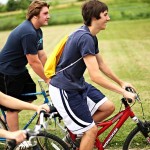 An increasing number of doctors and heart specialists today advocate heart check ups for youngsters, especially the ones who are physically active. This opinion of the medical fraternity is not without its facts – studies show that nearly 100,000 youngsters in the age bracket of 12 -24 years may die unexpectedly due to a cardiovascular disease.
An increasing number of doctors and heart specialists today advocate heart check ups for youngsters, especially the ones who are physically active. This opinion of the medical fraternity is not without its facts – studies show that nearly 100,000 youngsters in the age bracket of 12 -24 years may die unexpectedly due to a cardiovascular disease.
The figures are alarming and belie the popular belief – heart attacks occur only in old age. The two biggest contributors to these untimely deaths are:
- Undiagnosed innate heart malfunctions
- High blood pressure
Another startling finding is that the young adults who regularly play sports, exercise, or do some other physical activity are three times more likely to develop a fatal cardiac failure than those who are not physically active.
Who is the culprit: undiagnosed heart malfunction or exercise?
Does this mean that young adults who are physically active should give up playing sport?
As a parent, you may be tempted to think this way, but this is the last thing the studies advocate. Remember, youngsters don’t die because they are physically active, but because they have an undiagnosed congenital heart malfunction. It is just that young adults who are physically active exert more strain on their hearts while exercising or playing sports, thus increasing the chances of a fatal heart failure.
To reiterate, the problem is not the physical activity, but an underlying medical or heart condition which typically becomes fatal when youngsters exercise or play sports. The problem is that at best, before joining a sport activity or an exercise regime, students are subjected to only a basic physical health check up.
Youngsters fail to recognize the symptoms, generally because of their lack of awareness, or may downplay the symptoms as nothing more than a niggling health issue. That is why the onus is on the parents and doctors to ensure effective heart disease screenings in young adults. The key in preventing cardiac failures in young adults, especially those who are physically active, is to identify the condition before it becomes fatal.
The importance of conducting heart disease screenings in youngsters can be gauged from the fact that when Dr. Debauche, a cardiologist, conducted heart screenings of 2000 high school athletes with a routine EKG, 10% were found to have abnormal heart rhythms.
Symptoms parents should watch out for
Early detection of heart malfunction can save your kid’s life – do not ignore the symptoms as something trivial.
Symptoms that you need to watch out for in your children are:
- Constant headaches or tiredness
- Shortness of breath when performing regular tasks
- Vision changes
- More than normal sweating
- Frequent vomiting without any apparent reasons
- Irregular heartbeat
- Pain in the chest
- Nosebleeds
- Ringing in the ears
As a parent, you also need to remember that youngsters who have high blood pressure may not show any telling symptoms. Due to this reason, doctors advocate heart disease screenings in young adults.
EL331015

 Multiple Sclerosis
Multiple Sclerosis Banishing Bronchitis
Banishing Bronchitis Gum Disease Gone
Gum Disease Gone Overcoming Onychomycosis
Overcoming Onychomycosis Neuropathy No More
Neuropathy No More The Prostate Protocol
The Prostate Protocol Brain Booster
Brain Booster
 Ironbound
Ironbound
 Solution for Shingles
Solution for Shingles
 The Bone Density Solution
The Bone Density Solution
 The Ultimate Healing Protocol
The Ultimate Healing Protocol
 The Parkinson's Protocol
The Parkinson's Protocol
 The Chronic Kidney Disease Solution
The Chronic Kidney Disease Solution
 Overthrowing Anxiety
Overthrowing Anxiety The Fatty Liver Solution
The Fatty Liver Solution The Hypothyroidism Solution
The Hypothyroidism Solution
 The End of Gout
The End of Gout The Blood Pressure Program
The Blood Pressure Program
 The Oxigized Cholesterol Strategy
The Oxigized Cholesterol Strategy
 Stop Snoring And Sleep Apnea Program
Stop Snoring And Sleep Apnea Program
 The Arthritis Strategy
The Arthritis Strategy The Vertigo & Dizziness Program
The Vertigo & Dizziness Program The 3-Step Diabetes Strategy
The 3-Step Diabetes Strategy Hemorrhoids Healing Protocol
Hemorrhoids Healing Protocol The Erectile Dysfunction Master
The Erectile Dysfunction Master Weight Loss Breeze
Weight Loss Breeze The IBS Program
The IBS Program The Insomnia Program
The Insomnia Program The Migraine and Headache Program
The Migraine and Headache Program The Neck Pain Solution
The Neck Pain Solution The Menopause Solution
The Menopause Solution The Ejaculation Master
The Ejaculation Master The TMJ Solution
The TMJ Solution The Acid Reflux Solution
The Acid Reflux Solution The Fibromyalgia Solution
The Fibromyalgia Solution The Psoriasis Strategy
The Psoriasis Strategy